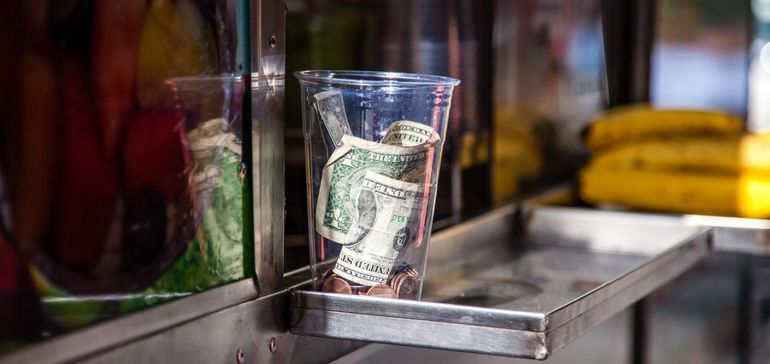Business associations back lawsuit challenging DOL’s 80/20 rule

kaarsten, Getty Images
Dive Brief:
- Four business associations — the National Retail Federation, National Federation of Independent Business, American Hotel and Lodging Association and the American Gaming Association — filed an amicus brief May 16 supporting a judicial challenge of the U.S. Department of Labor’s tip regulations. The lawsuit, filed by the National Restaurant Association’s Restaurant Law Center and the Texas Restaurant Association, centers on a provision commonly referred to as the 80/20 rule.
- In the brief, the associations said complying with the 80/20 rule would create “insurmountable burdens” due to a lack of compliance clarity. They also argued that tipped employees typically outearn minimum wage, obviating the need for the rule; that the rule would require “employee-monitoring systems that would come at enormous costs to employers and employees;” and that the characterization of “tip-producing” and “directly supporting” work is confusing and in conflict with “the realities of the service environment,” among other problems.
- “The organizations filing this amicus brief are united in the position that the Final Rule does not provide their members with critical clarity on how compliance could be achieved, if at all,” the organizations and their attorneys said in a statement provided to HR Dive. “The regulatory requirements in the Final Rule are ill-suited to the realities of the industries DOL seeks to regulate and the compliance challenges and significant costs the rule imposes have and will continue to negatively impact employees and businesses alike.”
Dive Insight:
The 80/20 rule, which the DOL most recently adopted in late October 2021, and which took effect Dec. 28, allows an employer to take a tip credit — i.e., include earnings from tips in their minimum wage calculations — only when tipped employees carry out duties that are part of their tipped occupation, defined as work that produces tips and “work that directly supports tip-producing work, provided the directly supporting work is not performed for a substantial amount of time.”
DOL defines directly-supporting work as exceeding a “substantial amount of time” if it is performed for a continuous period of time exceeding 30 minutes or if it “exceeds, in the aggregate, 20 percent of the employee’s hours worked during the workweek” — hence the “80/20” designation.
As the associations noted in their amicus brief, the DOL introduced the 80/20 rule to ensure tipped employees earn sufficient tips to make minimum wage. “This proposed rule provides more clarity and certainty for employers while better protecting workers,” Jessica Looman, DOL Wage and Hour Division acting administrator, said in June 2021. “It helps ensure that tipped workers are treated with dignity and respect, and that they receive wages appropriate for the work they perform.”
However, the associations — together with RLC and TRA, in their lawsuit — disputed this claim of increased clarity. They argued that the nature of work in restaurants and similar environments with tipped workers can make compliance with the 80/20 rule confusing, if not impossible.
“If a busser clears a table and replaces table linens, that is considered tip-producing work … But if a server clears a table to prepare for the next guest, that is deemed directly supporting work … This begs the question: in which category do these tasks fall if performed by a food runner? What if the employer utilizes no bussers, and servers clear the tables?” the brief hypothesized. The brief explored a wide variety of workplace circumstances and positions that complicate the 80/20 rule.
The 80/20 rule has a long history, and before its resurrection last year, came under fire during the Trump administration’s tenure.
This article, written by Emilie Shumway, appeared first on HR Dive.

